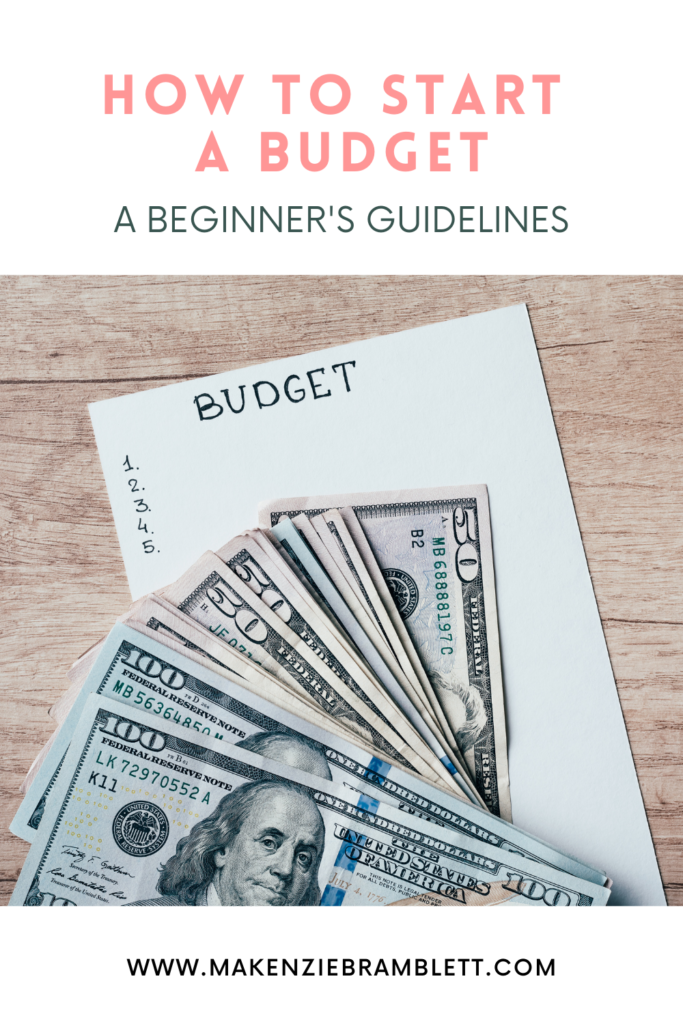Starting a budget and tracking your spending can feel overwhelming for so many people! I get it. It’s not always the easiest thing to commit to, but it’s an important tool to help you hit your money goals quicker.
A budget is an essential part of managing your money well, so you can live the life you want to live.
Budgeting is not one-size-fits-all. Some prefer the Dave Ramsey method with cash and envelopes, some prefer meticulous categories, and others like to have broad categories like spend and save. Whichever method makes the most sense (while getting you the results!) is what you should do.
I’m going to share what I’ve done for the past 7+ years that’s helped me stay debt free, save an emergency fund, and invest into retirement at 22. In the end, do what is best for you!

How to Start a Budget: The general guidelines
- Determine your goals. Ask yourself these questions: Why do I want to get my money under control? Do I need to pay off any debt? How much do I want to have saved? When do I want to retire? Are there any big ticket items I want to save up for (car, house, etc.)?
- Download the EveryDollar App. I use EveryDollar, but have friends who recommend Mint as well. A budgeting app will be your new best friend. This is your go-to place to view your money at a glance. Use it daily at the beginning, then find a schedule that works for you. I check mine about once a week.
- Using the app, enter your income and expenses. Line items like income, housing, utilities, and insurance should be fairly easy to fill in. If you aren’t used to tracking your money, the lifestyle expenses may seem overwhelming to add up. Look at your bank account and/or credit card for the last month to get a baseline. How much did you spend on groceries? Gas? Restaurants? Non-essential shopping? Hair cuts? Every. single. thing. needs to go into your budget in order to get a true full picture.
- Track. Your. Spending. When starting a budget first the first time you HAVE to get used to tracking your spending. Track, track, track. Your money doesn’t magically disappear each month 😉 You make daily decisions about where that money goes. In order to get a handle on your money, you need to know exactly where it’s going.
Evaluate your budget
- CONGRATULATIONS! You just made your first budget. At this point, you should be able to see where all of your money is going each month. Take it all in. Are you spending more than your income? Have extra left over? Do you see areas you already want to cut back?
- Let’s look at the percentage breakdown. If you’re using the EveryDollar app, you can tap on the colorful circle at the top, and it will show you a breakdown of your expenses by category. The general goal is to use 80% of your income on spending, and 20% on saving or investing.
- Do you have any debt? Tackle it first. Sometimes debt is a necessary evil. If you’re looking to start a budget and get your money managed, you need to focus on paying off your debt FIRST. When laying out your budget, see what expenses can be cut. Then, once you have an initial emergency fund saved (at least $1,000) put as much money as you can toward your debt. Be realistic with yourself, but also be disciplined. Being debt free is one of the best ways to live your dream life.
- Increase your income or decrease your spending. There are two ways to have more money: cut some of the extra expenses or increase the amount coming in. Cutting back may mean canceling a membership, or cooking at home more. Increasing your income could mean asking for a raise, more hours, or starting a side hustle.
Budgeting once you’re debt free
- Save and Invest. Once you’re debt free, refer back to the 80/20 rule. Live on 80% of your income, and save and invest the remaining 20%.
- Emergency Fund. Before you invest, I recommend saving 6 months of living expenses in an emergency fund. You never ever know when life is going to hit you hard. My emergency fund gives me the greatest peace of mind. Keep your emergency fund with your bank in an account that you can easily access. Ours is in a high yield savings account.
- Investing. Honesty time! Investing is confusing to me. So I have a financial advisor who handles it all, and advises us on the market. We make a call and he takes care of it. Yes, he gets a small percentage of our earnings but for me it’s well worth it. I opened my retirement account when I was 18, and he helped me set up the right goals that fit my situation.
- Give yourself grace. Money isn’t just numbers. Money has alllll kinds of emotions tied to it. Everyone starts in a different place, and depending on how you grew up you may feel differently about budgeting. A budget is simply a tool to empower you. It’s not the end-all-be-all. Like I said at the beginning, do YOU boo!
You can do this, friend!
Budgeting, like any new skill, is going to take time to learn. My biggest tips for sticking with it are: make budgeting a non-negotiable and always keep the end goal in mind.
Let me know if you have any questions below! I could talk about budgeting all day long.
Disclaimer: I am not a licensed financial advisor. I offer my opinions based on personal education and experiences, and the information should be taken as such.
comments